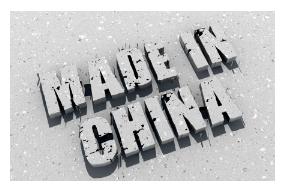Are you investing in China yet?
By Clark Schultz

The Chinese Revolution
If you are like me, when you think about China you almost get dizzy. It's hard to imagine over one billion people living in a country with a market for goods and services that is literally exploding as the country modernizes. By 2014 the International Monetary Fund estimates that over 10 percent of the world's GDP will be accounted for by China. Now that's an economic revolution.
You just can't help but wonder what kind of investment opportunities exist in China for individual investors like us?
Should you invest in China?
Before we discuss investment strategies, we should consider if it's unpatriotic to invest abroad. My answer is a simple no. First of all, if you invest in China and earn dividends or take profits, that money comes right back to the United States. Also, in the global economy countries rely on each other. We need the Chinese to keep buying our foreign debt and they need us to keep buying their goods.
China has a lot of long-term economic potential. This means that the earlier in your life you can start investing in China, the better off you may be. Even just a few dollars from your monthly paycheck could mean a big payoff at retirement if growth in China is as strong as projected. If you have an IRA account, investing in China may be even more advantageous due to the tax advantages and the power of compounding returns.
3 easy ways to invest in China
MoneyBlueBook has found a few good ways that you can invest in China, even if you are only starting with a small amount of money:
- Mutual funds that invest in China. There are funds that target Chinese stocks specifically or regional funds that target China along with other Asian countries. Morningstar.com is a good place to start in your search. You can sort funds by type, performance or holdings.
- Exchange-Traded Funds (ETFs) that target China. An ETF is simply a basket of related stocks that are traded openly on an exchange. You can use one of the best online brokers with low account minimums and good commission rates to buy ETFs.
- Chinese currency You can also bet on China by holding their currency called the yuan. Many U.S. banks will allow you to convert U.S. dollars into yuan directly or you can open a FOREX trading account at a brokerage firm. Just remember, currency trading can be high-risk, high-return.
One not so easy way to invest in China
So why not just buy individual shares of Chinese stocks? Why hit a single, when you can swing for a home run? The answer is that direct investing in Chinese stocks on the Shanghai Exchange, Hong Kong exchange or via American ADRs can be tricky, not to mention the higher commissions and service fees that you will get hit with. You also increase your risk when you own just a few stocks, instead of a mutual fund or ETF.
Take the stock of Baidu Inc., the company that runs the Chinese search engine that rivals Google, as an example. You could research the incredible growth potential of the market for internet search in China and evaluate the stock's fundamentals. But do you feel comfortable forecasting how the Chinese government may police or limit internet usage in China? That's what we mean by tricky and risky.
A better plan is to avoid buying individual stocks in China and let the expert portfolio managers worry about the politics in China.
Keeping the proper asset allocation
If you invest in China via mutual funds, ETFs or currency trading you have already helped to diversify your portfolio. Another important consideration is asset allocation. Many financial analysts recommend that you keep no more than ten to fifteen percent of your assets in foreign equities. This means as you buy more China-based assets, keep on eye on the total percentage of your portfolio wrapped up in China and other foreign investments.
Clark Schultz is a writer who contributes articles on the topics of finance, the economy and savings for major financial sites. He resides in University City, Missouri with his wife and three young children.
January 1, 1970 at 12:00 am